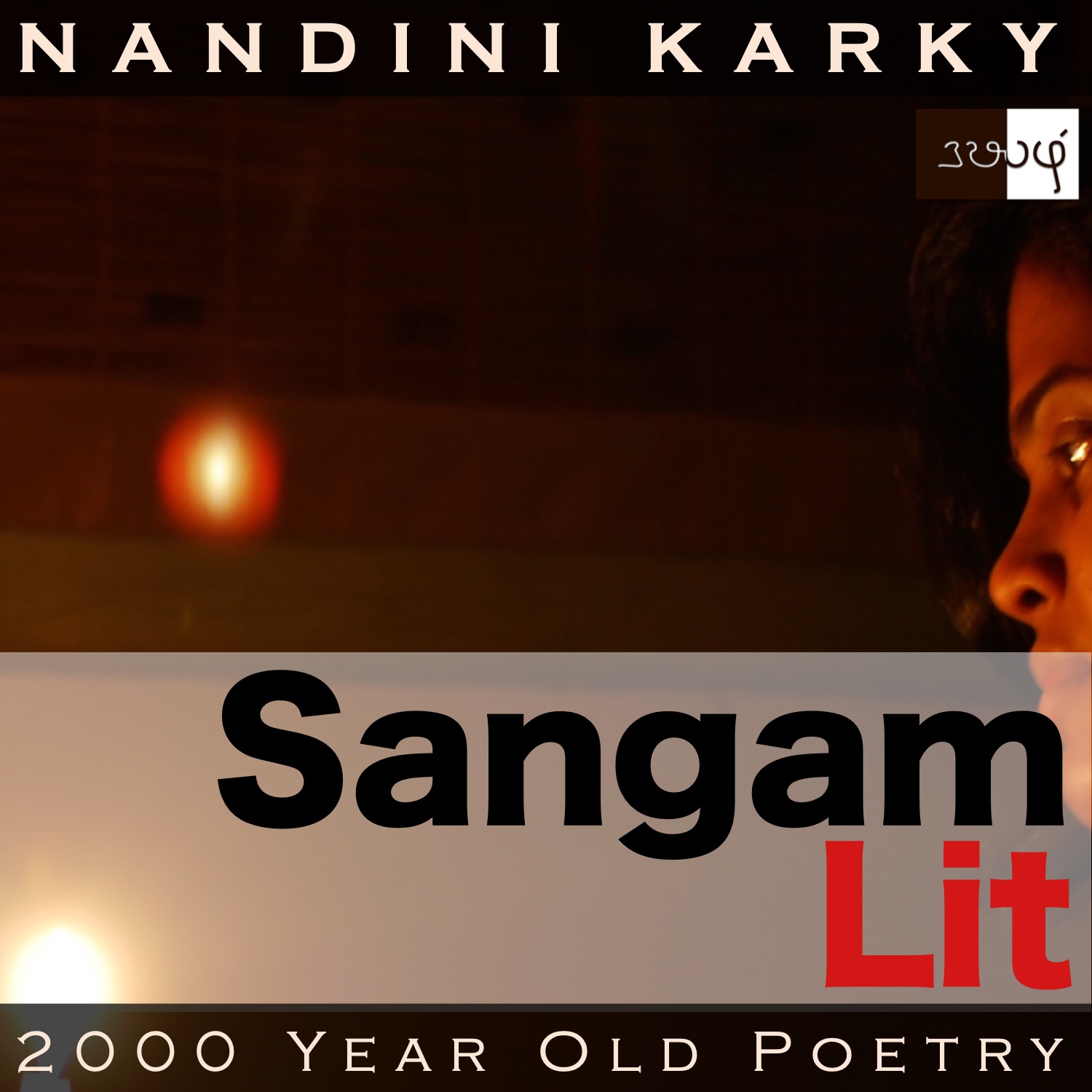Podcast: Play in new window | Download
Subscribe: Apple Podcasts | Spotify | Amazon Music | Android | iHeartRadio | TuneIn | RSS | More

In this episode, we understand the lifestyle of men and women as depicted in Sangam Literary work, Natrinai 41, written by Ilanthevanaar. The poem is set in the ‘Paalai’ landscape or the drylands, speaking in the voice of the lady’s confidante to the lady, consoling the lady as she suffers from the pain of separation.
பைங் கண் யானைப் பரூஉத் தாள்உதைத்த
வெண் புறக் களரி விடு நீறு ஆடி,
சுரன் முதல் வருந்திய வருத்தம் பைபயப்
பாஅர் மலி சிறு கூவலின் தணியும்
நெடுஞ் சேண் சென்று வருந்துவர் மாதோ-
எல்லி வந்த நல் இசை விருந்திற்கு,
கிளர் இழை அரிவை! நெய் துழந்து அட்ட
விளர் ஊன் அம் புகை எறிந்த நெற்றி,
சிறு நுண் பல் வியர் பொறித்த
குறு நடைக் கூட்டம் வேண்டுவோரே.
I smiled to see the appearance of ‘யானை’ meaning ‘elephant’. After encountering rare words for the animal, this was familiar, the Tamil term being the commonly used one to denote this beloved animal. In the word ‘கூவல்’, which I had assumed to be ‘a commotion or shouting’, there was an alternate meaning of ‘a pit or well’ here. Most surprising was in understanding the meaning of the word ‘எல்லி’ for it means ‘night’, ‘darkness’ and would you believe it, also ‘sun’ and ‘day’! How can the same word come to mean contradictory things such as the ‘day’ and ‘night’? Mysterious! With the fragrance of ‘நெய்’ meaning ‘ghee’ leading us on, let’s move into the ‘ஊன்’ or ‘meat’ of the poetic matter.
The man has parted from the lady, to go in search of wealth for their livelihood. The lady is inconsolable, feeling the pangs of being apart from him. The lady’s confidante tries to change her mind and heal her sorrow with her words. She says, “Walking on the difficult surface of the white wasteland, which is made harder by the tender-eyed elephant stomping on the ground, breaking the mud below and in turn, soaking your man with a layer of fine white dust. All such sorrows that arise in walking on the desert path slowly fade when savouring the water that springs out of little wells. O jewelled woman, your man who seeks to unite with you, the lady with a brisk walk, whose forehead is stained with little drops of sweat that arises in cooking a fine dinner of tender, fatty meat with ghee to serve to illustrious guests who arrive in the evening. Your man, who has travelled great distances to gather wealth, won’t he worry if he knows of your pained state?”
In this poem, I would like to focus on the contrasts depicted in the life of the man and woman and yet tying them together in a poetic manner. The poem seems to declare it’s the man’s duty to part in search of wealth and in his arduous path through the desert, with thirst tugging at his throat, he finds himself soaked in white dust that flies off the saline ground of the wasteland. He rushes to find the ‘சிறு கூவல்’ or ‘the little, hollow wells’, which make his many sorrows on this path fade little by little. At the same time, the poem seems to say that the woman’s duty is that which endears herself to her man, the act of cooking a fine dinner for the guests who arrive at their home, when night falls. In her duty of cooking tender meat that is also fatty, drizzling it with ghee, she finds the smoke rising from her pot, covering her forehead with ‘சிறு நுண் பல் வியர்’ meaning ‘many little drops of sweat’! Dust arises around the man and smoke around the lady, painting the shades of two different worlds they inhabit. And yet, sorrow has its place in both. The hardship of a difficult journey for the man and for her, the pain of separation. While that may be so, each must do their duty, the lady’s confidante seems to say.
Looking at this ancient world with our modern eyes, we know that such strict divisions of labour between the genders are continuing to fall apart. While those strict compartments may not be relevant to us, what we can gather from this, is that even as we share duties and live a fuller life, the paths and dreams of the partners vary. There is joy and sorrow in both their ways. Perhaps, like the wise confidante says, one should not hold back the other. The key indeed is to understand the aspirations and challenges of the other, which may be same or may be completely different, and let the other walk with freedom, in their chosen path. This understanding and acceptance of the dreams of the other is the thought that will live on, even in this more equal society!




Share your thoughts...